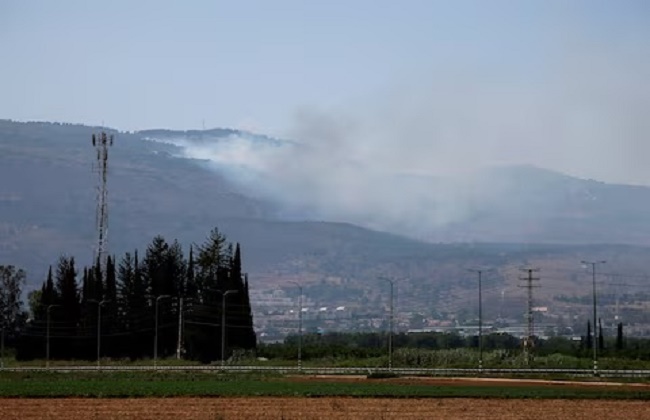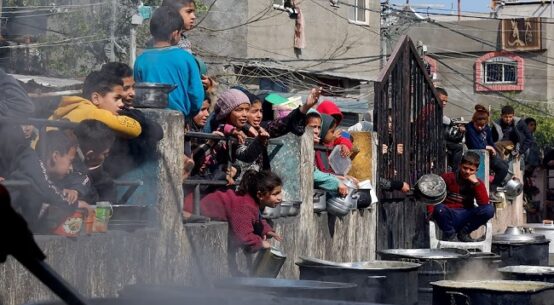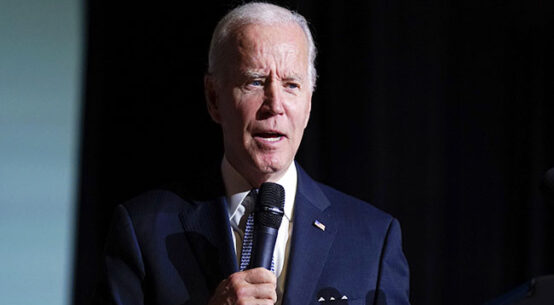
Regular puffs of smoke from missile intercepts over northern Israel and fires from air strikes in southern Lebanon are outward signs of a fear that the Gaza war may be expanding into a wider conflict, which analysts say poses risks for both sides.
The stark threats on Wednesday from Sayyed Hassan Nasrallah, the head of Hezbollah, that nowhere in Israel would be safe in the event of a war, and that even Cyprus and other parts of the Mediterranean would be in danger was the latest salvo in a rhetorical barrage from both sides.
Hezbollah has been firing rockets at Israel in solidarity with its Palestinian ally Hamas since the Gaza war erupted in October, forcing tens of thousands to flee homes in Israel, where political pressure is building for tougher action.
Tens of thousands of Lebanese have also fled their homes following Israeli strikes in south Lebanon.
Concerned at the risk of a slide into a war that could spread across the region, U.S. President Joe Biden sent his special envoy Amos Hochstein to embark on a new round of diplomacy this week and Secretary of State Antony Blinken told Israeli officials to avoid further escalation.
On Thursday, Israeli jets hit targets in southern Lebanon and killed a Hezbollah fighter it identified as a commander of the group’s operations in the Jouaiyya area. Hezbollah acknowledged his killing but did not identify him as a commander. After a brief pause over the Eid holiday, Hezbollah fired dozens of missiles into Israel.
“None of the options is good but the big question is, how much can Israel suffer under this attack?” said Orna Mizrahi, a former official in Israel’s National Security Council. “I think most of the government don’t really want to get into a war, but it’s possible that we are getting there.”
In Lebanon, Nasrallah’s comments left many bracing for a wider war. But some diplomats and analysts said his threats were an attempt to match the escalating rhetoric from Israel.
“To me, now this is part of a deterrent strategy,” said Hubert Faustmann, political analyst and professor of history and international relations at the University of Nicosia.
“There is a high danger of Israel escalating the confrontation with Hezbollah and an all-out, full-scale war, which I don’t think Hezbollah wants,” Faustmann added, saying Hezbollah was demonstrating what it “could do” if that were to happen.
Hezbollah has indicated it is not seeking a wider conflict, even as it has steadily drawn on more potent weaponry.
While Israel has the most powerful army in the Middle East, Hezbollah has thousands of fighters, many with experience in the Syrian civil war, and an arsenal of tens of thousands of missiles capable of hitting cities all over Israel.
It also has a large fleet of drones, one of which appears to have carried out an extended flight over the port city of Haifa this week, underlining the potential threat to key economic infrastructure including power systems.
Israeli Prime Minister Benjamin Netanyahu has warned Israel would “turn Beirut into Gaza” in the event of a war. But a wider escalation could also overwhelm Israel’s famed Iron dome missile defence system that has so far intercepted most of the hundreds of missiles fired by Hezbollah.
“My sense is that Hezbollah feels it has some leverage over the Israelis, because an escalating war – as much damage as it might do in Lebanon and Syria – would create terror in Israel,” said Seth G. Jones, an analyst at the Centre for Strategic and International Studies in Washington. “It would be a tall order for Israeli air defences to confront the widespread rocket arsenal coming from the north. It would be a huge problem.”


